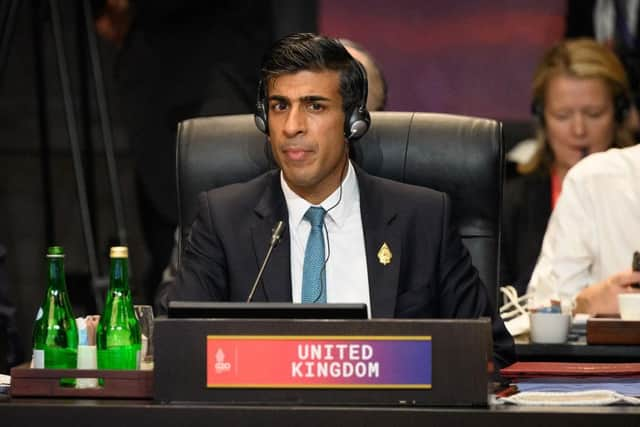G20: Declaration will see 'most' countries condemn war in Ukraine as Russia attacks Kyiv
The G20 declaration – a statement of intent agreed by G20 member nations at the end of their yearly summit – will be published on Thursday. However it is understood the declaration will address the issue of the invasion. Russia opted to send foreign minister Sergei Lavrov to the summit, rather than president Vladimir Putin.
Speaking at his first G20 summit as Prime Minister, Rishi Sunak told Mr Lavrov his country should “get out” of Ukraine, describing the war as “barbaric”. This comes as Kyiv has been attacked by a fresh round of Russian missiles.
Advertisement
Hide AdAdvertisement
Hide AdTwo residential buildings in the central Pechersk district were among those hit, the city's mayor Vitali Klitschko said, adding some missiles had been shot down.


Mr Zelensky addressed the summit by video, telling leaders the war “must be stopped”. He repeated the term “G19” – excluding Russia – multiple times during his address, in which he also described the liberation of the city of Kherson as being like “D-Day”.
The Ukrainian president said: “Now is the time when the Russian destructive war must and can be stopped. It will save thousands of lives.
However, Mr Zelensky said Ukraine would not agree to any third Minsk agreement – referring to two failed ceasefire deals between Kyiv and Moscow over the status of the eastern Donbas region earlier in the war.
"We will not allow Russia to wait, build up its forces, and then start a new series of terror and global destabilisation,” he said. "There will be no Minsk 3, which Russia will violate immediately after the agreement."
It has been reported this year's draft declaration states most countries condemn the conflict and agree it is exacerbating fragilities in the global economy. The declaration is also expected to call the potential use of nuclear weapons "inadmissible".
Reports have claimed the statement says "there were other views and different assessments of the [Ukraine] situation and sanctions", suggesting Russia did not agree to the language used. It is not known whether any other countries also opposed the sentiment of the declaration.
The members of the G20 are: Argentina, Australia, Brazil, Canada, China, France, Germany, India, Indonesia, Italy, Japan, Republic of Korea, Mexico, Russia, Saudi Arabia, South Africa, Türkiye, the UK, the United States and the European Union.
Advertisement
Hide AdAdvertisement
Hide AdMr Lavrov has already attacked the "politicisation" of the declaration. In a sideline meeting at the summit with Chinese president Xi Jinping, Mr Lavrov said he hoped for continuity in the Chinese government’s approach to cooperation with Moscow.
"There are no doubts that we will be able to tap into new opportunities to more fully unlock the potential of bilateral ties," he said.
The Prime Minister’s office has urged caution over the content of the declaration. Mr Sunak’s official spokesperson said: "Obviously we want any communique, should it be agreed, to be as strong as possible, recognising that the G20 is a different forum to the G7 and that it's largely focused on economic issues.
"But I wouldn't comment as inevitably there's more speculation about what may or may not be in it."
Mr Sunak has meanwhile said China poses a systemic challenge to UK values and represents the “biggest state-based threat to our economic security”. Britain will consider sending arms to help Taiwan to defend itself in the event of an attack from Beijing, Mr Sunak said.
He told reporters travelling with him to Indonesia: “My view is that China poses a systemic challenge to our values and interests and it represents the biggest state-based threat to our economic security. I think that view, by the way, is highly aligned with our allies.”
The Prime Minister declined to say whether he intended to officially re-categorise China as a “threat,” as his predecessor Liz Truss had pledged to do, signalling a softer stance towards Beijing.
His rhetoric also appears to have mellowed since his unsuccessful Tory leadership campaign in the summer, when he declared China “the biggest-long term threat to Britain”, while also promising to close all 30 of Beijing’s Confucius Institutes in the UK, including one in Edinburgh.
Advertisement
Hide AdAdvertisement
Hide AdThe shift drew criticism from former Conservative Party leader Sir Iain Duncan Smith, who warned the Prime Minister a “U-turn” would be “completely wrong”.
Ahead of the G20, Mr Sunak said it was “important” the UK defended itself against that, for example through the National Security Investment Act, which allows the Government to block investment in UK companies that might affect the country’s security.
He went on to say: “But I also think that China is an indisputable fact of the global economy and we’re not going to be able to resolve shared global challenges like climate change, or public health, or indeed actually dealing with Russia and Ukraine, without having a dialogue with them.”
Mr Sunak left open the possibility he could meet Mr Xi, saying ahead of the Bali gathering: “Hopefully I will have a chance to talk to him too.”
China-sceptic Sir Iain told Talk TV: “He said in the summer, categorically, that he considered China to be a systemic threat. So what we’re seeing here at the moment, I think, is the beginnings of a step away from his original position.
“It’s time to call them out as what they are, a threat, but I hope he’s not about to do a U-turn. It would be completely wrong.”
Joe Biden held highly anticipated talks with the Chinese leader on Monday, in which the US president objected to Beijing’s “coercive and increasingly aggressive actions” towards Taiwan.
For Mr Sunak, China’s economic clout means it will be necessary to balance trade benefits with caution over Beijing’s political motivations.
Comments
Want to join the conversation? Please or to comment on this article.